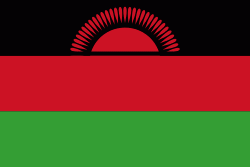Malawian kwacha
MK
The kwacha (ISO 4217: MWK, official name Malawi Kwacha ) is the currency of Malawi as of 1971, replacing the Malawian pound. It is divided into 100 tambala. The kwacha replaced other types of currency, namely the British pound sterling, the South African rand, and the Rhodesian dollar, that had previously circulated through the Malawian economy. The exchange rate of the kwacha undergoes fixed periodical adjustments, but since 1994 the exchange rate has floated. In 2005, administrative measures were put in place by Bingu wa Mutharika to peg the exchange rate with other currencies. Banknotes are issued by the Reserve Bank of Malawi. In May 2012, the Reserve Bank of Malawi devalued the kwacha by 34% and unpegged it from the United States dollar.The name kwacha was first used in Zambia, where the Zambian kwacha was introduced in 1968. It derives from the Chinyanja or Chichewa word meaning "it has dawned", while tambala translates as "rooster" in Chichewa. The tambala was so named because a hundred roosters announce the dawn.
Country
-
Malawi
Malawi, officially the Republic of Malawi, is a landlocked country in southeastern Africa. It is bordered by Zambia to the west, Tanzania to the north and northeast, and Mozambique to the east, south and southwest. Malawi spans over 118484 km² and has an estimated population of 19,431,566 (as of January 2021). Malawi's capital (and largest city) is Lilongwe. Its second-largest is Blantyre, its third-largest is Mzuzu and its fourth-largest is its former capital, Zomba. The name Malawi comes from the Maravi, a name for the Chewa people who inhabit the area. The country is nicknamed "The Warm Heart of Africa" because of the friendliness of its people.
In 1891, the area was colonised by the British and became a protectorate of the United Kingdom known as Nyasaland. In 1953, it became a protectorate within the semi-independent Federation of Rhodesia and Nyasaland. The Federation was dissolved in 1963. In 1964, the protectorate was ended: Nyasaland became an independent country under Queen Elizabeth II, and was renamed Malawi. Two years later it became a republic. It gained full independence from the United Kingdom, and by 1970 had become a totalitarian one-party state under the presidency of Hastings Banda, who remained in this role until 1994. Malawi has a democratic, multi-party republic headed by an elected president. Lazarus Chakwera of the Malawi Congress Party led the Tonse Alliance grouping of nine political parties and won the court-mandated Presidential Election rerun held on 23 June 2020 after the May 2019 Presidential Election was annulled due to electoral irregularities. The country's military, the Malawian Defence Force, includes an army, a navy, and an air wing. Malawi's foreign policy is pro-Western. It maintains positive diplomatic relations with most countries, and participates in several international organisations, including the United Nations, the Commonwealth of Nations, the Southern African Development Community (SADC), the Common Market for Eastern and Southern Africa (COMESA), and the African Union (AU).
